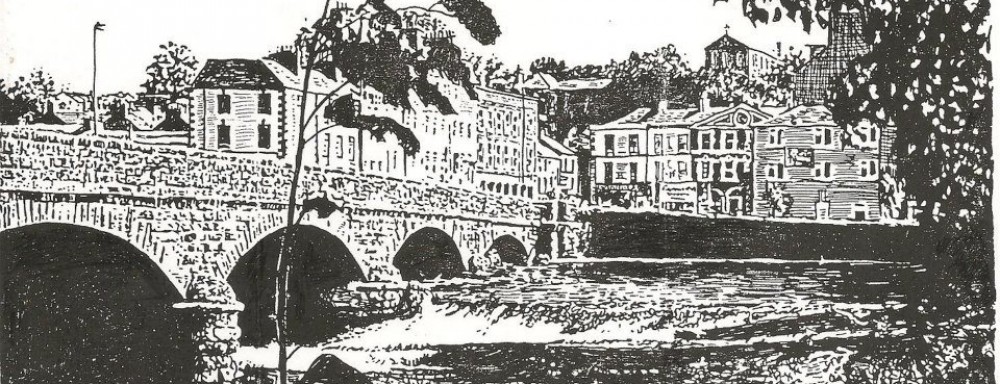Last week, I wrote a piece on homelessness ahead of the Cork Simon Ball. I was attempting to drum up some publicity for a picture I had donated for auction and I’m delighted to report that the piece was bought for €950. Many thanks to Colin Hanley of Medialab Limited, Galway, who made the generous purchase. Much gratitude too to Philip Nolan and to all who helped him raise €649 on Twitter. In total, that’s €1,599 which will do a lot to help some very vulnerable people. Well done, everyone!
In the course of putting that piece together, I had a few conversations with Sophie Johnston of Cork Simon. I had asked a number of questions about homelessness, among them “Has Cork Simon seen an increase in demand for its services since the economic downturn?”, “What are the reasons for homelessness? and “How do homeless people pass the time?“
I found Sophie’s replies most informative and, with her permission, I reproduce them below.
…
Increase in demand for services
Cork Simon has seen a steady increase in demand in recent years. In 2013 over 1,000 different people used our services. The number of people using our services increased by 16% in 2013 and the number of people sleeping rough also continued to increase during 2013, despite the addition of extra beds at Cork Simon.
(Towards the end of 2012, in response to a significant increase in the number of people sleeping rough, we added four extra beds at our Emergency Shelter bringing the total number of beds at the Shelter to 48. This time last year we also opened a five bed extension to one of our high support houses, bringing the total number of high support beds at Cork Simon to 52).
In total we have 127 beds (between our Emergency Shelter, our five high support houses and our supported independent-living flats) and these beds are all full every night of the year. At the moment about 7 people are sleeping rough on the streets of Cork nightly.
Soup Run
In addition to the increase in the number of people using our services and the number of people sleeping rough, about half the people availing of our Soup Run are in private rented accommodation. They are most likely using all available funds to pay their rent and don’t have money left for food – they’re quite likely on the edge of homelessness and possibly one pay cheque, one social welfare payment, or one emergency away from homelessness.
We meet approximately 30 people a night at the Soup Run. The Soup Run is often people’s first point of contact with Cork Simon. From here, staff and volunteers are able to link people in with the most appropriate services.
Reasons for Homelessness
Last year we published a report on pathways to homelessness, called How Did I Get Here? The report found that there is rarely one reason for why someone becomes homeless. In almost all cases, many different factors contribute to someone becoming homeless. These factors usually build up over a prolonged period of time – often beginning in childhood – until finally someone finds themselves overwhelmed by the multiplicity of difficulties in their lives. A combination of early school leaving, educational disadvantage, time spent in care, long-term unemployment, substance misuse, relationship breakdown, mental distress and poor physical health are all common factors that contribute to people’s pathways to homelessness.
How do people who are homeless pass the time?
Isolation, boredom, loneliness and the erosion of confidence and self-esteem are serious issues for people who are homeless and can lead to the deterioration of mental health and a dependence on alcohol and drugs as a means of escapism. We run a number of programmes in an effort to address these issues. One of these is our activities programme. The activities team, in collaboration with residents, organise events and activities from bingo nights to music lessons to ladies afternoons to cookery classes to nature walks. The idea is to provide people with a meaningful use of their time, to encourage them to socialise and build relationships once again and to support them to gently re-build their confidence.
The activities programme is often a stepping stone towards our Employment and Training Programme which works with people on an individual basis, identifying any gaps in their education and training and encouraging and supporting them on a pathway to training and employment. The Employment and Training team run courses based on the needs of residents ranging from basic literacy, numeracy and IT classes to FETAC accredited courses in areas such as woodwork, horticulture and culinary operations.
The Employment and Training team have also been successful in building relationships with businesses and developing work-experience placements and ultimately supporting people in progressing to employment. Many people who are homeless left school before the age of 14 and have difficulties with literacy and numeracy. Many also have few qualifications and limited work experience so there is a real practical need for the Employment and Training Programme, as well as it also offering people a meaningful use of their time and a way to re-build confidence and build relationships among peers and within the wider community.
Alongside skilled staff, we are lucky at Cork Simon to have a strong volunteer community. Many volunteers will spend a few hours each week with residents running activities, or doing something as simple as having a chat and a cup of tea with a resident or going for a walk. Little things like this help to give structure and routine, and help people to feel a part of their wider community again.
Here’s a link to Brian O’Connell’s report that he did just before Christmas and which covers the activity programme’s music session at the Emergency Shelter – http://www.rte.ie/radio/utils/radioplayer/rteradioweb.html#!rii=9%3A10228700%3A15036%3A06%2D12%2D2013%3A – skip to 43:20 to hear the report.
…
Many thanks to Sophie Johnston and to all at Cork Simon.
